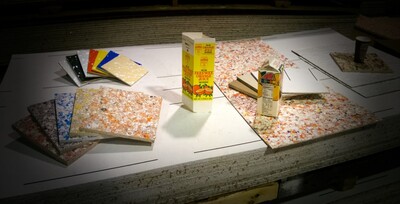Recycled beverage cartons to be used as building materials

Australian builders will soon be able to replace plywood, particle board and plaster board with low-carbon, environmentally sustainable construction boards made from packaging waste such as used beverage cartons and coffee cups.
saveBOARD Australia has received a $1.74 million grant from the federal and NSW governments towards setting up a $5 million facility that will turn packaging waste into high-performance building material. The facility is expected to create confidence in a new market for recycled construction materials, similar to roads made from recycled glass, and enable more packaging to become 100% recyclable, in line with national packaging targets.

The Australian Packaging Covenant Organisation (APCO) said this is a fantastic step forward for beverage cartons and for the brands and consumers that use this important type of packaging, with CEO Brooke Donnelly stating, “It is great to see this level of collaboration across the entire supply chain, addressing post-consumer materials by putting in place effective local end-market solutions.”
The first Australian saveBOARD plant will reprocess liquid paperboard beverage containers, including both aluminium-lined aseptic packages and non-aluminium-lined containers collected through the container deposit scheme and coffee cups collected through the Simply Cups recycling program. It will also source material from document recycling company Shred-X. Together with supplementary material from industrial processes, these items will be used to manufacture high-performance, low-carbon building products to substitute plaster board, particle board and oriented strand board (OSB) that can be used for interior and exterior applications.

The saveBOARD process uses heat and compression to bond materials, eliminating the need for glues or other chemical additives, to produce a clean product with zero volatile organic compounds (VOCs), suitable for use in homes and commercial buildings. saveBOARD co-founder and CEO Paul Charteris said the use of 100% recycled materials from everyday waste is a game changer that will transform the construction industry in Australia, enhancing the industry’s drive towards more sustainable construction practices.
The project is the first collaboration between Tetra Pak and SIG Combibloc in Australia under the umbrella of the Global Recycling Alliance for Beverage Cartons and the Environment (GRACE), and is a joint initiative with saveBOARD and its supporters Freightways and Closed Loop. Tetra Pak Oceania Managing Director Andrew Pooch said the solution demonstrates Tetra Pak’s commitment and contribution to a low-carbon economy, while SIG Combibloc Australia & New Zealand General Manager Adam Lipscomb said the project “is a key milestone towards achieving full onshore recycling capability for beverage cartons in Australia”.
Freightways CEO Mark Troughear said his company’s investment in saveBOARD allows it to grow its waste renewal division through a commitment to circular waste solutions with minimal carbon kilometres, all while providing a new strategic growth category. Closed Loop Managing Director Rob Pascoe meanwhile said saveBOARD products will be the lowest carbon footprint interior and exterior board products on the market, describing them as “the perfect example of the circular economy in action”.

New partnership to focus on textile recycling
Textile Recyclers Australia has joined forces with the ARC Research Hub for Microrecycling of...
TerraCycle marks a decade of recycling in ANZ
During its time in the region, the Australian and New Zealand TerraCycle network has grown from...
UNSW innovation extends the life of plastic waste
The new method, which also removes dyes from the original plastic waste, has attracted the...











